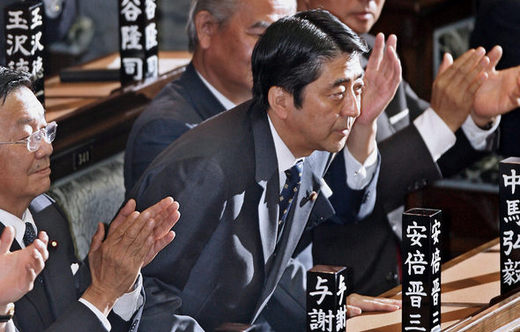 |
Aso Taro will again be foreign minister. He is ideologically similar to Abe, and the votes he won in the recent election for LDP chairmanship make him a political force to be reckoned with. As chief cabinet secretary and foreign minister, Abe and Aso have been the two most responsible for Japan’s international relations. They have never been personally close, but many observers have said they were virtually "made for each other" in that both called for a forceful response to North Korea’s recent missile launches. Aso, who many believe will eventually be prime minister, comes from a prominent family, much like Abe. He is the grandson of former PM Yoshida Shigeru, considered the architect of postwar Japan, and the son-in-law of another former PM, Suzuki Zenko. He is also the son of the founder of Aso Mining Company, which benefited in no small way from forced labor by Koreans during the colonial years. He is a regular source for the worst of the ultra-rightist statements coming from Japan in recent years, having claimed that Japan had Koreans adopt Japanese names only because Koreans wanted to do so, and that "it was the occupation forces that determined who Class A war criminals were." Many of Abe’s most faithful retainers have been chosen for positions in the prime minister’s office. Yamatani Eriko, who in the Diet has long worked for a more "patriotic" curriculum in Japanese schools, will be responsible for educational affairs. Unofficial spokesman Seko Hiroshige will handle public information, and Takumi Nemoto will oversee economic affairs. In addition to Yamatani’s appointment, Abe’s choice of Hakubun Shimomura as deputy chief cabinet secretary is also interpreted as preparation to revise the Basic Law on Education in order to make patriotism a more central part of the national curriculum. Shimomura has acted like Abe’s "other self" and was previously in charge of political affairs at the education ministry. Minister of economy, trade, and industry Amari Akira was once part of a LDP faction that opposed Abe’s rise in influence, but early on he declared his support for Abe and worked towards his election victory as the general secretary of his campaign headquarters. Abe chose to accept the recommendations for two of his new cabinet ministers, given to him by members of the upper house of parliament, probably out of a desire to avoid conflict. They are Misote Kensei, chairman of the National Public Safety Commission, and Wakabayashi Masatoshi, minister of environment. He chose Fuyushiba Tetsuzo, a member of the New Komeito party, to be his minister of land, infrastructure, and transport. The New Komeito party is part of the LDP-led coalition government.






